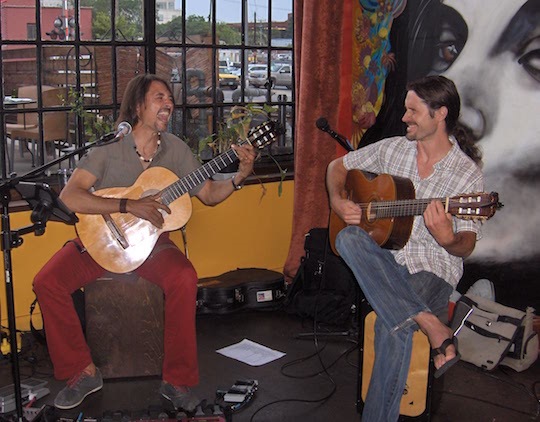We all have that friend who’s in the know about every cool music venue in town – the one who can recite the upcoming performance schedule of favorite local bands as if it was his/her own personal calendar. Well, your friend should meet the i.Lab’s friend – TuneCat founder Miles Pearce, the ultimate embodiment of that beloved archetype. Well-meaning advice givers often say that – in business and otherwise – you should stick to what you know, and Miles knows both music and Charlottesville like the back of his guitar-strumming hand.
Growing up in a musical family in Nelson County (just outside of Charlottesville), Pearce went on to major in Music at Wesleyan University, after which he began performing – a little bit of everything, but especially Spanish-style guitar, complete with latin rhythms and flamenco influences. Naturally drawn to entrepreneurship as well, Pearce parlayed his musical gifts into record-store employment and teaching jobs, utilizing an innate, scrappy entrepreneurial outlook to supplement his performing schedule. While he spent some time in Asheville, North Carolina, Charlottesville has always been home, boasting “an outsized music scene” for the small town that he knew and loved.
Another, more apt way of phrasing the “stick to what you know” advice, especially in this “Year of Effectuation” here at the i.Lab, can be found in the “Bird-in-Hand” principle (entrepreneurs start with what they have, who they are, and what they know), an idea he practiced when conceiving of TuneCat. “TuneCat was sort of conceptualized out of my own experience as a musician playing little restaurant and winery gigs,” he shares. After mounting frustration with the market’s existing tools for self-promotion and a lack of reach to traditional media outlets when trying to publicize an upcoming show, Pearce began sketching out the building blocks for a site that would help local musicians achieve reach beyond Facebook posts and email blasts to their existing fans. As Pearce explains it, “there’s a ton of support for larger, touring artists, but that takes tons of resources, so at this level we need a small way [to spread the word].”
With TuneCat, artists and venues can create an account to post their upcoming shows to the site’s calendar. Similarly, local music lovers can utilize TuneCat as a resource to discover new music and get upcoming concerts on their radar. Every step of the development process has been aided by Pearce’s unique eye toward the tools and resources musicians truly need, but he was concerned about a lack of the technical know-how he believed he needed to possess in order to get it off the ground.
The idea for TuneCat wasn’t Pearce’s first foray into entrepreneurship. Years ago, while living and teaching in Asheville, Miles had worked to launch a private lesson scheduling assistant, reflective of a major pain point in his own teaching experience. However, after about six months of slow progress, he became disillusioned with the challenges inherent in being a non-programmer trying to build a tech-focused product. The flipside of the “stick to what you know” adage is that it sometimes makes creative, motivated people feel they have to stay in their own lane, so when the idea for TuneCat emerged, he was especially wary about the idea of attempting another leap into the tech world.
When a successful entrepreneur came to Miles for guitar lessons, expanding her own skill set in the process, she encouraged him to do the same and take a leap of faith on this idea. “Yeah, you’re not a developer yet, but start building it [and find the right help when needed], and you will be,” he recalls her saying. Citing that conversation as a major turning point, Pearce moved back to Charlottesville, a place where “you can walk down the street and see a world-class musician at a local restaurant” to launch the idea in earnest.
As he looks toward the future, Pearce shares that “a central core part of the plan for TuneCat is to make it fully accountable for advocating and looking out for the needs of working musicians – [we intend to] build that into our company culture, equity structure, every part of our business.” He cites artist advocacy and protecting the interests of working musicians as his chief goals for the long-term mission of the company. As such, he couldn’t have picked a more conducive pilot city in which to launch his service. “[Charlottesville’s music scene] is an incredibly welcoming and supportive community, and I really have learned from my fellow musicians in Charlottesville that we all can win when we cooperate as a community. We all benefit from building a bigger collective fan base and building enthusiasm around the local scene.”
Music enthusiasts can check out TuneCat here.

